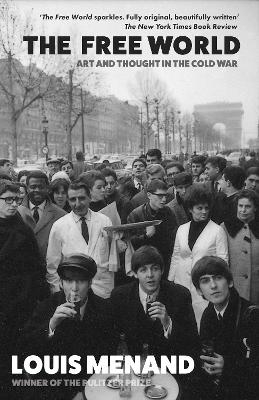
The Free World
Art and Thought in the Cold War
Seiten
2022
Fourth Estate Ltd (Verlag)
978-0-00-712688-0 (ISBN)
Fourth Estate Ltd (Verlag)
978-0-00-712688-0 (ISBN)
Shortlisted for the PEN Hessell-Tiltman Prize 2022
Longlisted for the 2021 National Book Award for Nonfiction
The Cold War was not just a contest of power. It was also about ideas, in the broadest sense – economic and political, artistic and personal.
In The Free World, the acclaimed Pulitzer Prize–winning scholar and critic Louis Menand tells the story of American culture in the pivotal years from the end of World War II to Vietnam and stresses the rich flow of ideas across the Atlantic.
How did elitism and an anti-totalitarian scepticism of passion and ideology give way to a new sensibility defined by experimentation and loving the Beatles? How was the ideal of ‘freedom’ applied to causes that ranged from anti-communism and civil rights to radical acts of self-creation via art and even crime? With the wit and insight familiar to readers of The Metaphysical Club, Menand takes us inside Hannah Arendt’s Manhattan, the Paris of Jean-Paul Sartre and Simone de Beauvoir and the post-war vogue for French existentialism, structuralism and post-structuralism.
He also shows how Europeans played a vital role in promoting and influencing American art and thought, revealing how America’s once neglected culture became respected and adored. With unprecedented verve and range, this book offers a masterly account of the main characters and minor figures who played part in shaping the post-war world of art and thought.
Longlisted for the 2021 National Book Award for Nonfiction
The Cold War was not just a contest of power. It was also about ideas, in the broadest sense – economic and political, artistic and personal.
In The Free World, the acclaimed Pulitzer Prize–winning scholar and critic Louis Menand tells the story of American culture in the pivotal years from the end of World War II to Vietnam and stresses the rich flow of ideas across the Atlantic.
How did elitism and an anti-totalitarian scepticism of passion and ideology give way to a new sensibility defined by experimentation and loving the Beatles? How was the ideal of ‘freedom’ applied to causes that ranged from anti-communism and civil rights to radical acts of self-creation via art and even crime? With the wit and insight familiar to readers of The Metaphysical Club, Menand takes us inside Hannah Arendt’s Manhattan, the Paris of Jean-Paul Sartre and Simone de Beauvoir and the post-war vogue for French existentialism, structuralism and post-structuralism.
He also shows how Europeans played a vital role in promoting and influencing American art and thought, revealing how America’s once neglected culture became respected and adored. With unprecedented verve and range, this book offers a masterly account of the main characters and minor figures who played part in shaping the post-war world of art and thought.
Louis Menand is Professor of English at Harvard University and a staff writer at The New Yorker. His books include The Metaphysical Club, which won the Pulitzer Prize in history and the Francis Parkman Prize from the Society of American Historians. In 2016, he was awarded the National Humanities Medal by President Barack Obama.
| Erscheinungsdatum | 17.08.2022 |
|---|---|
| Verlagsort | London |
| Sprache | englisch |
| Maße | 129 x 198 mm |
| Gewicht | 580 g |
| Themenwelt | Geschichte ► Allgemeine Geschichte ► Neuzeit (bis 1918) |
| Geschichte ► Allgemeine Geschichte ► Zeitgeschichte | |
| ISBN-10 | 0-00-712688-3 / 0007126883 |
| ISBN-13 | 978-0-00-712688-0 / 9780007126880 |
| Zustand | Neuware |
| Haben Sie eine Frage zum Produkt? |
Mehr entdecken
aus dem Bereich
aus dem Bereich
Europa 1848/49 und der Kampf für eine neue Welt
Buch | Hardcover (2023)
DVA (Verlag)
48,00 €
Giordano Bruno - ein ketzerisches Leben
Buch | Hardcover (2024)
C.H.Beck (Verlag)
29,90 €


